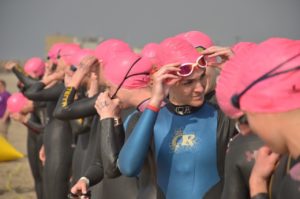- Calls to this hotline are currently being directed to Within Health, Fay or Eating Disorder Solutions
- Representatives are standing by 24/7 to help answer your questions
- All calls are confidential and HIPAA compliant
- There is no obligation or cost to call
- Eating Disorder Hope does not receive any commissions or fees dependent upon which provider you select
- Additional treatment providers are located on our directory or samhsa.gov
Elite Athletes and Anorexia Nervosa: What Coaches, Trainers, Administrators & Parents Need to Know – Part 7

Eating Disorder Treatment for Athletes
If an athlete has been referred to an eating disorder professional who provides eating disorder treatment for athletes, the clinician will determine what level of care is needed.
If the athlete continues to work at an outpatient level of care, they will possibly remain active in their career, schooling, and perhaps with their sport’s team.
As such, it will be the role of the coach, trainer, administrator, and parent to communicate with the athlete and the treatment team so that they can really inform on best practices, on how and when to reintegrate training and competition, etc.
It is essential that the athlete finds a treatment team, if a higher level of care is needed, that understands eating disorders and has expertise in treating athletes as well as understands and appreciate the importance of sport in their life.
If a higher level of care is needed, the athlete may need to take some time off from school or work as well as training and competition.
As such, their treatment team should be able to help them through some of the struggles that come from being an athlete and seeking treatment for an eating disorder.
Treatment Targets
In “The Victory Program,” a sport’s dietitian will work with the athlete to restore energy balance.
As a strength conditioning coach, I must frequently communicate with the dietitian to determine the caloric needs to support the energy expenditure in their training.
Our sports psychologists also help the athlete expand their self-identity and self-worth out of their sport and help the athlete utilize a variety of different coping skills throughout treatment.
Ultimately, as a team, we want to help the athlete develop a more wholesome relationship with their food, their body, and their sport.
Treatment Challenges
It can be terrifying to face eating disordered behaviors head-on with a skilled treatment team, and it is also frightening for an athlete to take time off of their sport, especially if they have a metabolic injury.
They may also need to re-establish trust because they might worry about the contradictory messages they are getting from all the people trying to provide care for them.
Athletes with anorexia are often also concerned about their sport’s performance that may change if they enter into treatment, so it is important to be sensitive to this.
Many of these athletes are used to logging serious training hours, so, the decreased training volume and intensity can be really startling at first. They may also be afraid of some of the body weight or body composition changes that occur when modifying their food intake in the treatment setting.
Sometimes, the patience and time needed for true healing and recovery can be incredibly overwhelming. Again, with all of this, being supportive and understanding is key.
It is encouraging that, over time, many athletes with anorexia will embrace these challenges and start to heal and get their lives back.
Assessing Readiness to Reintegrate Training & Competition
This is where my role comes into play as a strength and conditioning coach.
 When talking about clearing the athlete to participate in fitness, it is not just about weight; it is essential to look at the whole picture.
When talking about clearing the athlete to participate in fitness, it is not just about weight; it is essential to look at the whole picture.
An athlete who is medically unstable should not be practicing or be competing, so, it is important that administrators are working with their sport’s physicians to make sure that the athlete’s labs and vital signs are falling within appropriate ranges, that the athlete’s bone health and cardiac health are taken into account.
Everyone in the sporting world should be aware that a low heart rate is often seen as a marker of excellent cardiovascular health, but there is a difference between a healthy heart and a heart at risk for heart attack.
It can be damaging to assume an athlete with a low heart rate is at their peak condition.
The athlete must be motivated to work on a healthier relationship with fitness and be an active participant in redefining what that looks like in their sport’s life.
Reintegrating training and competition for the athlete is absolutely not without its challenges, so it is important to have a strength and conditioning coach or athletic trainer or fitness professional to be there and support them through that.
The athlete has to really be in a recovery-focused mindset once they start adding their sport back in. The individual must also be accepting of daily caloric increases to support their training plan.
They must show an ability to self-regulate excessive movement or standing and again utilizing a variety of different coping skills, especially if their sport has been their number one way of coping with life and difficult stressors.
They cannot be in a mindset where they are continuously asking “when can I go back” because unhealthy motives around fitness can really fuel this motivation to get back to training again.
Return to Sports
The International Olympic COmmittee’s “Return to Sport” model is really helpful to look at and can help inform policies and guidelines around an athlete with anorexia returning to sports.
At this moment, the role of the coach or trainer that has experience in exercise and eating disorders is an essential member of the treatment team.
Without fitness training parameters, the athlete will tend to fall back into some of their old training habits which have, most likely, been unbalanced and often damaging to their body and performance.
The coach, trainer, or strength and conditioning coach is going to help inform guidelines on frequency, intensity, volume, and progression of their training workouts., again, with close collaboration with the sport dietitian to be sure that their training is supported by their current meal plan, and they aren’t falling into a state of relative energy deficiency.
Sometimes, an athlete may also decide they want to transition out of their sport. This is important because it is a significant life transition and can be difficult for the athlete.
A treatment team can help them navigate this transition and meet them where they are at and support their decision. As a strength and conditioning coach, this could look very different than them returning to sports.
 If they are returning to their sport, their training and meal plan will look completely different. This is where it is important to understand what the athlete’s goals are and what is appropriate for them.
If they are returning to their sport, their training and meal plan will look completely different. This is where it is important to understand what the athlete’s goals are and what is appropriate for them.
I always remind our athletes that not all strength is built in the gym.
An athlete with anorexia who has gone through eating disorder treatment often comes out much stronger, both mentally and physically, than they were when they were competing prior to treatment and coming into treatment.
They may have never fully tapped into their full potential due to not feeling themselves for the amount of training that they were doing or their focus being shifted to other factors. I’ve seen athletes leave treatment with more mental toughness and grit than some athletes without eating disorders.
An unfortunate thing is, sometimes, we see an athlete is in a really good place mentally and physically after treatment, and some athletic departments or parents don’t want the athlete to return to sports due to the fear they will be a liability in their program or bad memories of how the eating disorder played out in their sport’s setting.
I would absolutely encourage coaches, trainers, administrators, and parents to be in close communication with the eating disorder treatment team when making these decisions. Healing and behaviors change can really happen with the proper treatment.
Returning to sports after eating disorder treatment is entirely possible, it just needs to be integrated with this core of the entire treatment team and support system.
With a high level of communication and support, we can all do our part in helping the athlete with anorexia reach their full athletic goals and, most importantly, enjoy their life outside of their eating disorder.
Please See
Elite Athletes and Anorexia Nervosa: What Coaches, Trainers, Administrators & Parents Need to Know – Part 1
Elite Athletes and Anorexia Nervosa: What Coaches, Trainers, Administrators & Parents Need to Know – Part 2
Elite Athletes and Anorexia Nervosa: What Coaches, Trainers, Administrators & Parents Need to Know – Part 3
Elite Athletes and Anorexia Nervosa: What Coaches, Trainers, Administrators & Parents Need to Know – Part 4
Elite Athletes and Anorexia Nervosa: What Coaches, Trainers, Administrators & Parents Need to Know – Part 5
Elite Athletes and Anorexia Nervosa: What Coaches, Trainers, Administrators & Parents Need to Know – Part 6
Source:
Virtual Presentation by Amanda Schlitzer Tierney, MS, CSCS in the May 17, 2018, Eating Disorder Hope Online Conference II: Anorexia Hope & Healing in 2018.
Please view the press release Here.
Author:
 Amanda Schlitzer Tierney, MS, CSCS is a NSCA Certified Strength and Conditioning Specialist and holds her Master’s degree in Sport and Exercise Psychology from Lock Haven University and her Bachelor’s degree in Psychology from Chestnut Hill College. Amanda is currently the Co-Chair of the Association for Applied Sports Psychology: Eating Disorder Special Interest Group. Amanda has been working with athletes and non-athletes with eating disorders since 2006. Over the years, Amanda gained a wide-range of knowledge for this specialized population and found her true passion: helping individuals incorporate balanced exercise into the recovery environment. Learn More About Amanda Schlitzer Tierney.
Amanda Schlitzer Tierney, MS, CSCS is a NSCA Certified Strength and Conditioning Specialist and holds her Master’s degree in Sport and Exercise Psychology from Lock Haven University and her Bachelor’s degree in Psychology from Chestnut Hill College. Amanda is currently the Co-Chair of the Association for Applied Sports Psychology: Eating Disorder Special Interest Group. Amanda has been working with athletes and non-athletes with eating disorders since 2006. Over the years, Amanda gained a wide-range of knowledge for this specialized population and found her true passion: helping individuals incorporate balanced exercise into the recovery environment. Learn More About Amanda Schlitzer Tierney.
 About the Transcript Editor: Margot Rittenhouse is a therapist who is passionate about providing mental health support to all in need and has worked with clients with substance abuse issues, eating disorders, domestic violence victims, and offenders, and severely mentally ill youth.
About the Transcript Editor: Margot Rittenhouse is a therapist who is passionate about providing mental health support to all in need and has worked with clients with substance abuse issues, eating disorders, domestic violence victims, and offenders, and severely mentally ill youth.
As a freelance writer for Eating Disorder and Addiction Hope and a mentor with MentorConnect, Margot is a passionate eating disorder advocate, committed to de-stigmatizing these illnesses while showing support for those struggling through mentoring, writing, and volunteering. Margot has a Master’s of Science in Clinical Mental Health Counseling from Johns Hopkins University.
The opinions and views of our guest contributors are shared to provide a broad perspective of eating disorders. These are not necessarily the views of Eating Disorder Hope, but an effort to offer a discussion of various issues by different concerned individuals.
We at Eating Disorder Hope understand that eating disorders result from a combination of environmental and genetic factors. If you or a loved one are suffering from an eating disorder, please know that there is hope for you, and seek immediate professional help.
Published on August 13, 2018.
Reviewed & Approved on August 13, 2018, by Jacquelyn Ekern MS, LPC
Published on EatingDisorderHope.com

The EatingDisorderHope.com editorial team comprises experienced writers, editors, and medical reviewers specializing in eating disorders, treatment, and mental and behavioral health.

